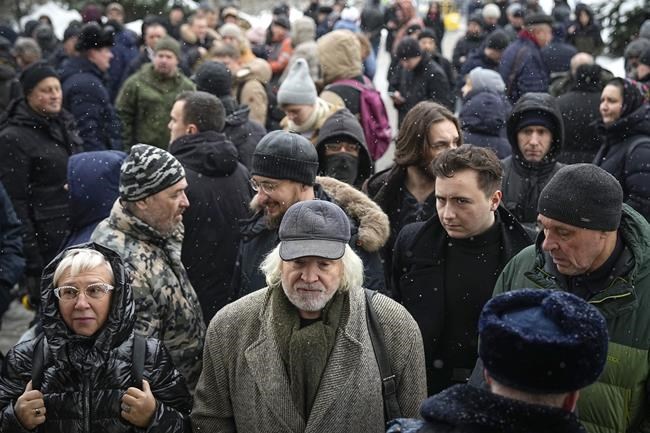TALLINN, Estonia (AP) — A Russian court on Thursday sentenced a woman to 27 years in prison for a cafe blast that killed a prominent pro-war blogger after he was given a bust of himself that later exploded.
In a separate proceeding, a Moscow court convicted a former leader of separatist rebels in Ukraine who called President Vladimir Putin a coward of extremism and sentenced him to four years.
Darya Trepova, 26, was convicted by a court in St. Petersburg of carrying out a terrorist attack, illegal trafficking of explosive devices and forging documents in the April 2 blast at the cafe in which Vladlen Tatarsky was killed and 52 others were injured.
Tatarsky, 40, was an ardent supporter of the Kremlin’s military action in Ukraine and filed regular reports on the fighting from the front lines.
Trepova was seen on video presenting Tatarsky with the bust moments before the blast at the riverside cafe in the historic heart of Russia’s second-largest city where he was leading a discussion.
She insisted that she didn’t know the bust contained a bomb. Russian authorities have blamed Ukrainian intelligence agencies for orchestrating the bombing. Authorities in Kyiv have not directly responded to the accusation.
The court also convicted Trepova's acquaintance Dmitry Kasintsev of concealing a grave crime for sheltering her after the blast and sentenced him to 21 months in prison.
The Moscow court imposed a four-year sentence on Igor Girkin, who used the surname alias of Strelkov (shooter), was the most prominent leader of Russian-backed separatist fighters in Ukraine’s Donetsk region in 2014, when rebellion arose after the ouster of Ukraine’s Russia-allied president.
He briefly became the self-declared separatist government’s defense minister, but left the post in August 2014 after rebel forces shot down a Malaysian passenger airliner over Donetsk, killing all 298 people aboard. He was convicted in absentia of murder in the Netherlands, where the flight had originated, for his role.
He returned to Russia and became a nationalist commentator and activist. He supported launching Russia’s war in Ukraine, but sharply criticized authorities for being inept and indecisive in carrying out the fight.
Girkin called Putin a “nonentity” and a person of “cowardly mediocrity.” He was arrested in July on extremism charges and remained in custody since then.
His conviction reflects the high sensitivity of Russian authorities to criticism and opposition. After Russia launched its full-scale invasion of Ukraine in February 2022, that sensitivity intensified sharply, with the passage of laws criminalizing statements and news reports that allegedly discredit the Russian military.
Two protesters calling for Girkin to be freed were detained by police outside the court building, Russian news agencies said.
Girkin's sentence was considerable less harsh than those handed to some figures who have denounced the war, notably the 25-year sentence imposed on opposition figure Vladimir Kara-Murza.
Treopva's sentence is the longest imposed on a woman in modern Russia, according to the Mediazona website that reports on human rights and justice issues.
Tatarsky, who had filed regular reports from Ukraine, was the pen name for Maxim Fomin, who had accumulated more than 560,000 followers on his Telegram messaging app channel.
Born in eastern Ukraine, Tatarsky worked as a coal miner before starting a furniture business. When he ran into financial difficulties, he robbed a bank and was sentenced to prison. He fled from custody after a Russia-backed separatist rebellion arose in 2014, then joined separatist rebels and fought on the front line before turning to blogging.
Tatarsky was known for his blustery pronouncements and ardent pro-war rhetoric.
Jim Heintz, The Associated Press




